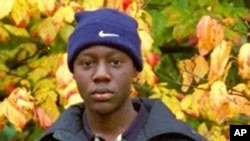A new report by an independent panel published in Britain says there is no evidence that alleged bomber Umar Farouk Abdulmutallab was radicalized at a British university. Abdulmutallab is accused of trying to blow up a U.S.-bound flight on Christmas Day last year.
Stephen Wall is chair of the governing body at Britain's University College London, where Abdulmutallab was a student. University College London appointed the independent panel which conducted the study .
What evidence showed
He says the evidence suggests that on the outside, at least, the 23-year-old Nigerian was a well adjusted student.
"Those who knew him, both academics and his friends, described him as moderate, affable, sociable, football-player, a devout Muslim but in no way trying to proselytize others, responsible president of the Islamic society," Wall said.
Abdulmutallab graduated from UCL in 2008. He's accused of trying to blow up a U.S. bound airplane on December 25 of the following year, by concealing a bomb in his underwear. He faces six federal charges in the U.S. including the willful attempt to blow up an aircraft.
When the bomb scare happened some analysts suggested that Britain's universities were becoming a hub for the radicalization of Muslims in Britain.
A broad review of the situation is currently being carried out by a representative body of British universities.
Need for change
But Wall says the results show that UCL, at least, is no breeding ground for terror. Nonetheless, he says some changes may need to take place.
"Obviously we have to think about the balance of free speech on the one hand and incitement on the other," noted Wall.
The report recommended that UCL do more to monitor visiting speakers and scrutinize student events.
Benjamin Ward, from the international watchdog Human Rights Watch, says people in Britain must be free to discuss non-violent beliefs.
"It's often people who espouse non-violent but nevertheless extreme views who are most likely to have traction with the young men who are engaged with violence," Ward said. "So I think shutting off those avenues of discussion is actually unhelpful."
Anti-terrorism measures
He says a major source of radicalization in Britain is the government's Draconian anti-terrorism measures, which he says have isolated some communities.
"Abusive counterterrorism measures that violate human rights are actually extremely counterproductive in efforts to prevent radicalization and recruitment," Ward added.
Abdulmutallab has pleaded not guilty to the charges of trying to blow up the Northwest Airlines plane.
Study: Christmas Bomber 'Not Radicalized at British University'




